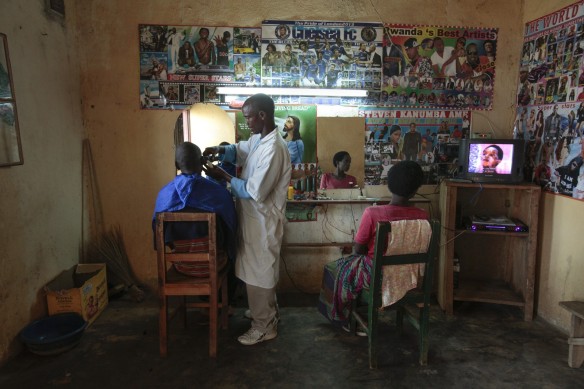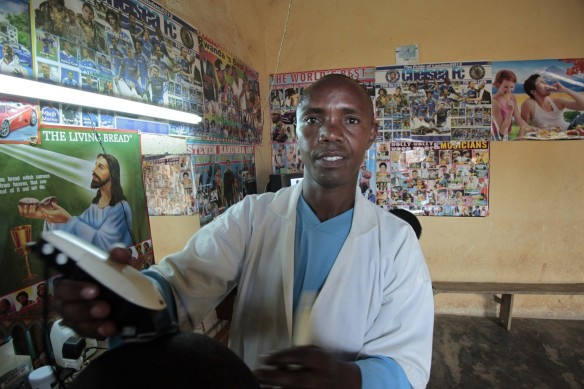
Meet Aloys, the barber from Muruma
Aloys Nsabimana fires up his electric clippers and gets to work. Overhead, Chelsea FC’s 2013 line-up and a group of “new super stars” look down from a jumble of posters. A customer watches TV.
Squint hard enough and you’re almost in London. But this is Muruma village, Bugesera District, Eastern Province, Rwanda – in short, a world away – where the floors are swept clean but there’s no tile underfoot, just raw earth, and the posters conceal crumbling mud brick.
Business is buzzing
Ask Aloys how CARE and Hand in Hand have changed his life and he’ll happily count the ways. “Before I had nothing – nothing – to spend each day. Now I can spend 1,000 RWF (US $1.45) or 1,500 RWF (US $2.20) in a morning. I have a cow. I have a house. I have wife and five children. I can pay school fees, I can buy health insurance and when the children are sick, I can buy medicine.”
His secret: electricity. There are plenty of barbers in Bugesera District, but despite government plans to electrify 70 percent of homes and businesses nationwide by 2017, only one is connected to the grid. Want a buzzcut? Aloys is your man. Some TV? He’s got that covered, too. Factor in his side business charging mobile phones and the 40-year-old is making 180,000 RWF (US $260) a month – almost five times the national average.
A dark past
Aloys was 20 years old when the genocide literally decimated Rwanda, displacing an estimated 800,000 people and killing some 800,000 more. The country has come a long way in the 20 years since: in 2014, the UNDP noted Rwanda’s “accelerated progress” on 15 MDG indicators – the fourth most anywhere – and in 2017, the World Bank’s “ease of doing business” index ranked it 56th to Belgium’s 42 and Luxembourg’s 59. But there’s still a long way to go. Globally, Rwanda ranks 158 of 189 on the UN Human Development Index – and it gets worse. In rural Rwanda, home to Aloys and the rest of Hand in Hand’s entrepreneurs, poverty is three times greater than in the city.
The country’s dual fortunes – improving, but not fast enough – are neatly summed up in its education rates. Primary school enrolment is now above 98 percent, the highest in all of Africa. But more than three-quarters of students, 72 percent, don’t make it to secondary school.
A bright future
Aloys was one of them. Lacking education – though not the entrepreneurial spirit – he started off selling clothes in Kigali, then moved to the country to start his own farm when the venture failed to take off. When that failed too, he set up shop underneath a tree in Murama village, Ngeruka sector, and started cutting hair at 100RFW a pop. Finally, he’d found his calling.
 But it wasn’t until 2009, when he joined a local Village Savings and Loan Group organised by Hand in Hand field partner CARE, that he also found success.
But it wasn’t until 2009, when he joined a local Village Savings and Loan Group organised by Hand in Hand field partner CARE, that he also found success.
The going was tough to begin with. In the months following the group’s inception, Aloys and others could barely scrape together 150 RWF (US $0.20) per week. Today, having all met success, they’re each saving 500 RWF (US $0.70). It was a loan for 280,000 RWF (US $400) that enabled Aloys to start his first barbershop, still going strong with help from two employees, at home. Buoyed by his initial success, and with help from a Hand in Hand business trainer, he next applied for a loan of 500,000 RWF (US $700) from the Savings and Credit Organisation.
Plans to expand
Aloys knows he won’t be the only barber in Bugesera with electricity for long. That’s why, ever the entrepreneur, he plans to take a course on cutting women’s hair just as soon as he becomes debt-free. A third loan will follow, this one to pay for the resulting equipment. He’ll probably get some new posters, too.
Aloys’ results
Possible to provide health insurance and medicine for his family
![]()
Monthly income of 180,000 RWF (US $260) – almost five times the national average
Able to send all of this children to school
Hand in Hand Eastern Africa and CARE Rwanda are co-operating to empower some 100,000 Rwandans, mostly women, to work their way out of poverty by running their own sustainable businesses. The three-year, US $3.2 million partnership is grounded in our shared belief in the power of entrepreneurship to fight poverty.
Next case study: Meet Gloria, the former refugee growing crops – and profits

